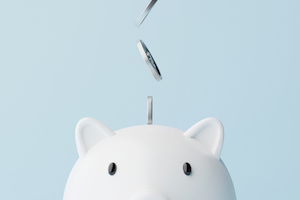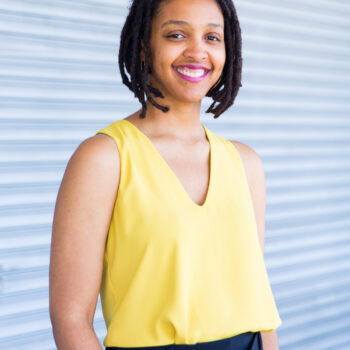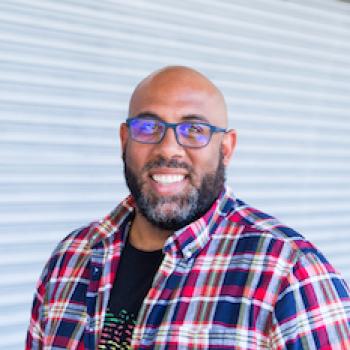Listen in to the second episode of Raci$m Is Profitable, a podcast by and for people of color that aims to dismantle the assumptions that fuel the oppression economy. The podcast is hosted by Jeremie Greer and Solana Rice, the co-founders and co-executive directors of Liberation in Generation Action. In this episode, they talk with Demond Drummer of PolicyLink about scarcity — the racist lie that our government can’t afford to invest in our communities. You can read an edited transcript below or check out the full episode here.
Solana Rice: You talk a lot about money as a public good. That’s a real push back on our current beliefs. Say more about how money is a public good. Like, it’s in my wallet right now. Isn’t it mine?
Demond Drummer: All money is public; there is no such thing as private money. What do I mean by that? Money is a thing that our government creates to mobilize resources — natural, human, and otherwise — to get things done for our society. And in some cases, that’s providing public schools or a postal system or other things that the government does directly. In other cases, it’s things like doughnuts and haircuts, which the government doesn’t provide. All money is created by our government, either directly through Treasury spending or indirectly through bank lending. When banks aren’t lending to Black folks and women and people of color, it means that we are not benefiting from the expansion of the money supply, which means our money supply is almost staying stagnant.
Jeremie Greer: So the government creates the money. Somehow it gets out to us. How does that work?
Drummer: We have a central bank that creates our money, right? During the pandemic, we just invented trillions of dollars out of thin air.
Rice: Do you mean we’re actually printing it? We’re like, doo doo doo, we’re turning the crank?
Drummer: It’s not literally printed. It’s the Federal Reserve that’s managing the entire ledger.
Greer: They hit Enter on the keyboard, and it creates the money.
Drummer: Type in some zeros. Done. All money originates at the Federal Reserve. And it either goes into the financial system or the US Treasury. For every ten dollars distributed by the Fed, nine dollars goes to the banks. The majority of the money in circulation — the majority of money being created — is in the financial sector. This is why equity in lending matters. This is why regulation of private banks matters. This is why the creation of public banks matters.
Look what happened during the pandemic. We had record unemployment and astronomical growth in the stock market. COVID really showed how bad of a job these private banks — particularly these large, hyper-consolidated conglomerate banks — do in getting money out into our society. They get interest income off of lending it out. So they’re getting profit off of doing public work.
Greer: They decide who they loan to. So this nine to one — the one is being allocated through a democratic process. Congress appropriates the money; the administration that we vote for disperses the money. That’s the one dollar. The nine dollars is a bunch of bankers deciding what cities they loan to, what people they loan to, what businesses they loan to. A vast majority of money is distributed by people who are not democratically accountable to anybody.
Rice: And haven’t had a great track record with people of color.
Drummer: Not only are they not accountable; they’re increasingly all based in Charlotte, North Carolina, or New York. It was precisely the same situation that the farmers in North Dakota found themselves in. When they created the Public Bank of North Dakota, the New York banks were not lending to farmers in North Dakota. So they created their own public bank. And guess what? Municipalities borrow from the public bank to build schools. That public bank is who North Dakota students get their student loans from. That public bank got PPP money out to people, very efficiently, because it was accountable and designed for the people of North Dakota. That public bank enabled North Dakota to actually increase the employment rate during COVID.
We have this terrible situation where the direction of our entire economy is dictated by the decisions of what is and is not short-term profitable to JP Morgan, Bank of America, Wells Fargo, Goldman Sachs — and it just absolutely makes no sense.
Rice: Why do we stand for these banks being in the middle of our government and our money?
Greer: And we’re standing for this when they won’t lend any money to us. And when they do lend money to us, they say, “Well, you can only do it and live in these neighborhoods and run these types of businesses.” There’s all these strings attached. Why should we stand for this? If all money’s public, it seems like government-funded discrimination when they allow it to play out that way.
Drummer: Absolutely. Government-enabled extraction and getting cut out of our economy.
Greer: Politicians always talk about the deficit and the debt and how we can’t afford things. I would love to hear you talk a bit about how those narratives drive this cycle of oppression.
Drummer: We got PAYGO [the congressional rule that you can’t create new spending unless you pay for it through either a budget cut or tax increase] when the Democrats took over the House in 2018. The fact that this was a topline issue for Democrats, as they took over the House of Representatives in 2018…
This whole way of understanding the national debt, deficit spending, PAYGO — it’s all part of a rhetorical and ideological project to constrain our government’s ability to get things done for us. This is about falsely asserting and literally enforcing an oppressive narrative of scarcity. This is a far-right mindset and worldview that was sold to the American public by the likes of Ronald Reagan. And later Bill Clinton. And later George W. Bush. And later Barack Obama. Definitely Donald Trump. And a little bit of Joe Biden. Democrats in the US are operating off of a far-right worldview when it comes to economics. And there is no path to liberation from a racist far-right economic worldview.
Greer: When someone says we can’t afford this, what they’re saying is, they don’t want Black people to have healthcare. They don’t want Black people to have this, they don’t want Black people to have that. Because the reality is, we can do all that stuff.
Drummer: America has always been able to afford what it decides to do. When you trap an entire federal budget of the most powerful institution on the face of this earth — the US government — on no new money unless you raise taxes or cut spending, you really hamstring a very powerful institution. And think about it. They never say, “There’s not enough money to give a tax cut.” It’s the same thing y’all. A $2 billion tax cut is the same exact thing as $2 billion in spending. Now, I know it doesn’t sound like it is. But think about that. If it doesn’t sound the same, it’s because we have this moral idea of the tax cut giving motherfuckers their money back and $2 billion in spending giving muhfuckas who don’t deserve no money money. But that’s not what’s going on. That’s actually a moral frame that has been sold to us. That ain’t true. From an accounting perspective, it is the exact same thing. The question then becomes, which one gets the most done in our society? Does a tax cut to the richest families get things done in our economy? Or does $2 trillion of additional spending to build highways, bridges, provide health care, better schools? That’s actually the analysis. What gets the most done for the American people. And if you do it the wrong way, you jack up your economy. That’s exactly what we’re seeing today.


